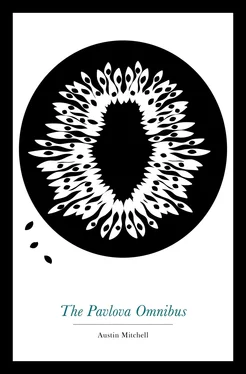Austin Mitchell - The Pavlova Omnibus
Здесь есть возможность читать онлайн «Austin Mitchell - The Pavlova Omnibus» — ознакомительный отрывок электронной книги совершенно бесплатно, а после прочтения отрывка купить полную версию. В некоторых случаях можно слушать аудио, скачать через торрент в формате fb2 и присутствует краткое содержание. Жанр: unrecognised, на английском языке. Описание произведения, (предисловие) а так же отзывы посетителей доступны на портале библиотеки ЛибКат.
- Название:The Pavlova Omnibus
- Автор:
- Жанр:
- Год:неизвестен
- ISBN:нет данных
- Рейтинг книги:5 / 5. Голосов: 1
-
Избранное:Добавить в избранное
- Отзывы:
-
Ваша оценка:
- 100
- 1
- 2
- 3
- 4
- 5
The Pavlova Omnibus: краткое содержание, описание и аннотация
Предлагаем к чтению аннотацию, описание, краткое содержание или предисловие (зависит от того, что написал сам автор книги «The Pavlova Omnibus»). Если вы не нашли необходимую информацию о книге — напишите в комментариях, мы постараемся отыскать её.
The Pavlova Omnibus — читать онлайн ознакомительный отрывок
Ниже представлен текст книги, разбитый по страницам. Система сохранения места последней прочитанной страницы, позволяет с удобством читать онлайн бесплатно книгу «The Pavlova Omnibus», без необходимости каждый раз заново искать на чём Вы остановились. Поставьте закладку, и сможете в любой момент перейти на страницу, на которой закончили чтение.
Интервал:
Закладка:
SIXTH LETTER Sixth Letter: Sex or the New Zealand Woman’s Weekly Seventh Letter: Seven Days Shalt Thou Labour: The Games Kiwis Play Eighth Letter: The Kiwi Sniggers: A Brief Guide to New Zealand Humour Ninth Letter: The Medium is the Tedium Tenth Letter: The Kulture of the Kiwi Bird Eleventh Letter: Overseasia Twelfth Letter: Processed Pom
SEX or the New Zealand Woman’s Weekly Sixth Letter: Sex or the New Zealand Woman’s Weekly Seventh Letter: Seven Days Shalt Thou Labour: The Games Kiwis Play Eighth Letter: The Kiwi Sniggers: A Brief Guide to New Zealand Humour Ninth Letter: The Medium is the Tedium Tenth Letter: The Kulture of the Kiwi Bird Eleventh Letter: Overseasia Twelfth Letter: Processed Pom
MOST COUNTRIES have oppressed minorities. New Zealand has an oppressed near majority, sometimes called The New Zealand Woman, sometimes known by her Christian name, Sheila. She’s constructed locally from internationally approved patterns. Basic design is good and sturdy, though finish is unimaginative and trimmings limited. Controls are in the usual place and she needs little attention or maintenance: mumble at her occasionally, slap her on the back (never the bottom) and you can ignore her for hours. Above all, she’s clean—fanatically so—and you will be, too, if you have anything to do with her. Yet aside from her outstanding contribution to the soap industry, what is her role? America is female dominated; France is male dominated. New Zealand you have to accept as a world divided into ‘his’ and ‘hers’.
The ‘his’ compartment includes all the positions of power and the interesting jobs, all the folk heroes and all the dominant myths: sport, war and virility. Woman’s role is to run the home, raise the children and make the scones. Like Dr Johnson, a Kiwi is ‘better pleased when he has a good dinner upon his table than when his wife talks Greek’, though he might tolerate a little flower arranging. Naturally the Outward Bound Trust, considering courses for girls, thought flower arrangement, make-up and nursing more appropriate than the more energetic pursuits for boys. With the comfortable average measurements of 36-28-39, Norma Average is built to be mater not Mata Hari.
Despite her impressive statistics, Women’s Liberationists find the Kiwi woman as underdeveloped as Twiggy. She leaves school almost a year before the male and she’s half as likely to go to university. New Zealanders are low on the world league for the proportion of women working. Only a third go out to work and then usually in lowly paid jobs: a seventh of men workers get under $1,400 compared with two-thirds of women, while the average man gets over $1,000 a year more than the average woman. Female Cabinet Ministers are as rare as the captive kakapo, no woman has ever run a government department, only eleven have ever sat in Parliament, and now only 5 per cent of M.Ps, 7 per cent of those embalmed in Who ’ s Who and 8 per cent of doctors are believed to be female. The rare woman who gets to the top gets there by transforming herself into a man in skirts, an embattled suffragette, or as a token gesture—most bodies feel it necessary to appoint a woman, an advisory broad, in the same way as a token Maori. Even the leaders of the campaign for female emancipation are men. Like its counterparts elsewhere, the Pohutamanurewa Women’s Liberation Movement (membership three) has a male quorum after 9.30 p.m.—the two women members have to be home early to prepare hubby’s supper and bake cakes.
A situation which horrifies overseas emancipationists hardly interests the New Zealand woman. She’s programmed to want something different. Unimportant, honorific positions from Prime Minister to chairman of U.E.B. can be left to mere males. The female has real power and a more fulfilling role. The male clings to the myths of dogged masculinity as social conformity, and the growth of organisations and bureaucracies steadily emasculate him. The New Zealand woman is still a pioneer, the last to savour the joys of being an independent small businessman. She commands and manages the home unit. She determines the destinies of its denizens, mobilises its resources, manages its labour force of husband and children. Welfare and tax determine the floors and ceilings of the man’s income. Much more important in determining the family’s welfare is the way the woman mobilises the minimum the husband provides. Her housekeeping, budgeting, scrimping and saving and her efforts at the cottage industries of dressmaking and bottling make all the difference to the family’s wellbeing.
The Kiwibird has the job of the small entrepreneur or the pioneer. She also has the characteristics. No wilting violet she, with her capacity for hard work and her dogged toughness. The dull plumage hides a fierce spirit. She knows what she wants—a husband, a lovely home, children, preferably though not necessarily in that order. Woe betide anything or anyone who stands in her way for she’s a fierce and terrifying species. Her looks betray her spirit. Where the Kiwi male has a face younger than his body, her efforts have told to such an extent that her body is younger than her face.
Unfortunately her role doesn’t provide universal satisfaction. Since she marries at 20 and has produced 2.6 children by the time she’s 28, the joys of being a homemaker (notice the distinction from the English ‘housewife’) can pall when the children grow up, if only because it’s useless. Sometimes she takes refuge in neurotic symptoms from backache to the National Council of Women. Or she throws herself into a strident hostility to change because she feels herself let down and without realising why, dimly puts it down to forces beyond her control. More than one in three go back to work around forty as an under-paid labour force, though slightly less exploited than the remainder, who devote themselves to the frenzied organisational work which alone keeps the machinery of welfare and education going. Committees are the opium of the people. The field of endeavour ranges from the Women’s Division to the Mothers’ Union competition for the best pikelet. Rarely does the embattled female fighting the rearguard action of life on one or all of these fronts realise that she is doing all this because the role she is programmed for has let her down.
Compared with the dogged singlemindedness of the single ladybird, and the implacability of the Great New Zealand Mum, the man’s role is that of an ephemeral faineant. While she bottles, he gets pickled, seeking escape from a home he can’t dominate, in the boozy camaraderie of the pub or the solitudes of the garden. The only thing he’s allowed to run is the car. He hasn’t even got the initiative to form the Men’s Liberation Front, the Y Front, to support his case.
While other advanced countries move towards unisex, this role tension between men and women is a basic division in their society. In literature it becomes a dominant theme of intermittent guerilla war or entrenched mutual incomprehension. In life it is the weak spot of their paradise, a vague, little understood dissatisfaction, a weakness in the roles they think should satisfy and fulfil, but somehow don’t. In other countries the social battleground reflects the basic tension in society: in Britain, class; in America, colour. In New Zealand the battlefield is sex.
Your first impression will be that sex does not exist. The word is not used and the act itself is referred to as UNO, as in the phrase, ‘They were going out with each other for six months and (pause) you know’. UNO is thus different from ‘yer know’, because the one is something too shocking to talk about, the other too boring to discuss. Yet even when you know the name it is difficult to discover whether UNO exists. It may have been abolished as a distraction from the war effort by a government committed to the socialisation of the means of reproduction, distribution and exchange.
Читать дальшеИнтервал:
Закладка:
Похожие книги на «The Pavlova Omnibus»
Представляем Вашему вниманию похожие книги на «The Pavlova Omnibus» списком для выбора. Мы отобрали схожую по названию и смыслу литературу в надежде предоставить читателям больше вариантов отыскать новые, интересные, ещё непрочитанные произведения.
Обсуждение, отзывы о книге «The Pavlova Omnibus» и просто собственные мнения читателей. Оставьте ваши комментарии, напишите, что Вы думаете о произведении, его смысле или главных героях. Укажите что конкретно понравилось, а что нет, и почему Вы так считаете.












